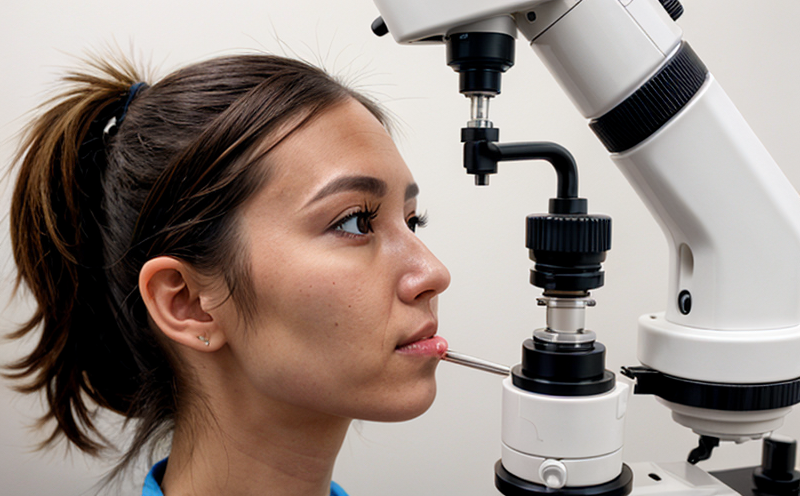ISO 18369-7 Contact Lens Shelf Life and Stability Testing
The ISO 18369-7 standard is a critical component in ensuring the safety, efficacy, and reliability of contact lenses. This standard provides guidelines for determining the shelf life and stability of contact lens products under various storage conditions. Compliance with this standard ensures that the product remains safe and effective throughout its intended use period.
The testing process involves several stages to assess the performance of contact lenses over time. Initially, a representative sample of lenses is obtained from production batches. This sample size must be sufficient to ensure statistical significance according to ISO 18369-7. The lenses are then subjected to controlled environmental conditions that simulate real-world storage scenarios.
The stability testing typically includes exposure to temperature and humidity variations as defined in the standard. Samples are stored under these conditions for durations specified by the manufacturer or regulatory requirements, up to a maximum of 52 weeks. During this period, physical properties such as water content, oxygen permeability, and mechanical strength are monitored regularly.
Chemical stability is another crucial aspect tested according to ISO 18369-7. This involves evaluating the potential for degradation or contamination that could compromise lens safety and performance. The test procedure includes assessing the change in chemical composition over time using analytical methods like high-performance liquid chromatography (HPLC).
The results of these tests are compiled into detailed reports, which provide comprehensive insights into the shelf life and stability characteristics of contact lenses. These reports serve as critical documentation for manufacturers to ensure compliance with regulatory standards and for quality assurance teams to monitor product integrity.
Compliance with ISO 18369-7 is not only a requirement but also a commitment to excellence in the medical device industry. By adhering to these stringent testing protocols, companies can build trust with healthcare providers and consumers alike, ensuring that their products meet the highest standards of safety and efficacy.
Understanding the nuances of ISO 18369-7 is essential for those involved in quality management, compliance, research & development (R&D), and procurement within the medical device sector. This knowledge helps stakeholders make informed decisions regarding product design, manufacturing processes, and regulatory submissions.
Why It Matters
The shelf life and stability of contact lenses are paramount to public health. These factors directly impact how long a lens remains safe and effective for wearers. By adhering to ISO 18369-7, manufacturers can demonstrate that their products maintain their intended characteristics throughout the recommended storage period.
From a regulatory perspective, compliance with this standard ensures that contact lenses meet stringent quality control measures required by health authorities worldwide. This alignment supports smoother interactions between manufacturers and regulatory bodies, reducing the likelihood of product recalls or market withdrawals due to non-compliance issues.
For healthcare providers, knowing that contact lenses comply with ISO 18369-7 provides peace of mind regarding patient safety. It allows them to recommend products they know have been rigorously tested for shelf life and stability. This trust fosters stronger relationships between healthcare professionals and their patients.
R&D engineers benefit from understanding the requirements set forth in ISO 18369-7 as it guides them towards developing more robust and reliable contact lenses. By incorporating these standards early in the design phase, they can streamline development processes and reduce costs associated with late-stage modifications or failures during testing.
Lastly, procurement teams play a vital role in ensuring that only compliant materials are sourced for manufacturing purposes. Knowledge of ISO 18369-7 helps them evaluate suppliers effectively, choosing those who meet the highest standards in shelf life and stability testing.
Why Choose This Test
Selecting ISO 18369-7 contact lens shelf life and stability testing offers numerous advantages that cater to various stakeholders within the medical device industry:
Rigorous Testing Protocol: The test adheres strictly to internationally recognized standards, ensuring high levels of accuracy and reliability.
Comprehensive Evaluation: It evaluates multiple aspects including physical properties (water content, oxygen permeability), chemical stability, and mechanical strength, providing a holistic view of the product's performance.
Regulatory Compliance: By meeting these stringent requirements, manufacturers can satisfy regulatory demands without compromising on quality or safety.
Informed Decision-Making: Quality managers gain valuable insights into potential risks and opportunities associated with different storage conditions, enabling better decision-making processes around product launches and updates.
Enhanced Reputation: Demonstrating adherence to such rigorous testing protocols enhances a company’s reputation among consumers, healthcare providers, and industry peers alike.
Sustained Quality Assurance: Continuous monitoring through regular retesting ensures sustained quality assurance over extended periods, supporting long-term reliability of the product.
Environmental and Sustainability Contributions
The shelf life and stability testing outlined in ISO 18369-7 contributes positively to both environmental sustainability and overall industry standards:
Eco-Friendly Production Practices: By ensuring that contact lenses remain effective for their intended period, manufacturers can optimize production schedules, reduce waste generation, and minimize resource consumption.
Reduced Waste Generation: Longer shelf life means fewer instances of unused products being discarded prematurely, thus reducing environmental impact.
Informed Consumer Choices: Providing accurate information about the shelf life helps consumers make informed decisions when purchasing contact lenses, promoting responsible usage habits.
Industry Leadership: Compliance with ISO 18369-7 sets a benchmark for industry leadership in terms of product quality and sustainability practices. It encourages other manufacturers to adopt similar standards, fostering an environment of continuous improvement across the sector.





